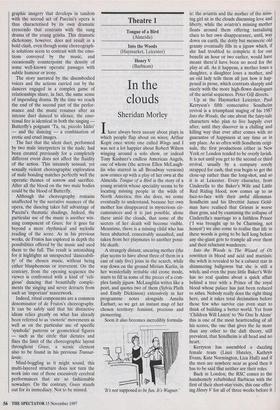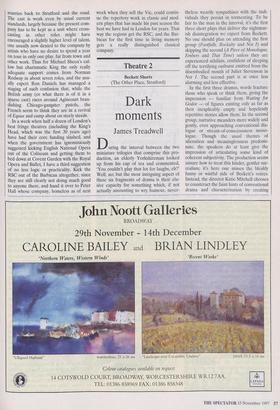Theatre 1
Tongue of a Bird (Almeida) Into the Woods (Haymarket, Leicester) Henry V (Barbican)
In the clouds
Sheridan Morley
Ihave always been uneasy about plays in which people flap about on wires; Arthur Kopit once wrote one called Wings and I was not a lot happier about Robert Wilson winging around a solo show, or indeed Tony Kushner's endless American Angels, one of whom (the actress Ellen McLaugh- lin who starred in all Broadway versions) now comes up with a play of her own at the Almeida. Tongue of a Bird is the story of a young aviatrix whose speciality seems to be locating missing people in the wilds of North America; this she does, we come eventually to understand, because her own mother has disappeared in mysterious cir- cumstances and it is just possible, alone there amid the clouds, that some of the secrets of her death will become visible. Meantime, there is a missing child who has been abducted, conceivably assaulted, and taken from her playmates to another possi- ble death.
A strangely distant, uncaring mother (the play seems to have about three of them in a cast of only five) joins in the search, while way down on the ground Miriam Karlin, in her wonderfully irritable old crone mode, starts to fill in some of the pieces of a com- plex family jigsaw. McLaughlin writes like a poet, and quotes two of them (Sylvia Plath and Emily Dickinson) extensively in her programme notes alongside Amelia Earhart, so we get an instant map of her chosen territory: feminist, precious and pioneering.
Soon it also becomes incredibly formula- It's not supposed to be fun. It's Wagner.' ic: the aviatrix and the mother of the miss- ing girl sit in the clouds discussing love and liberty, while the aviatrix's missing mother floats around them offering tantalising clues to her own disappearance, until, way down on earth, the dotty but mesmeric old granny eventually fills in a jigsaw which, if she had troubled to complete it for our benefit an hour or two earlier, would have meant there'd have been no need for the play at all. As it happens, a mother loses a daughter, a daughter loses a mother, and an old lady tells them all just how it hap- pened in prose, which contrasts sharply and nicely with the more high-flown duologues of the aerial sequences. Peter Gill directs.
Up at the Haymarket Leicester, Paul Kerryson's fifth consecutive Sondheim revival is a triumphant staging of his 1987 Into the Woods, the one about the fairy-tale characters who plan to live happily ever after, until they discover in a chilling and killing way that ever after comes with no guarantee of happiness at any time or in any place. As so often with Sondheim origi- nals, the first productions either in New York or London tended to be overly lavish. It is not until you get to the second or third revival, usually by a company sorely strapped for cash, that you begin to get the close-up rather than the long-shot, and so it is at Leicester. Every character, from Cinderella to the Baker's Wife and Little Red Riding Hood, now comes up to us face-to-face with their awful dilemmas. Sondheim and his librettist James Gold- man have realised that Grimm is worse than grim, and by examining the collapse of Cinderella's marriage to a faithless Prince CI was brought up to be Charming, not honest') we also come to realise that life in these woods is going to be hell long before any she-giant gets to trample all over them and their reluctant wanderers.
Into the Woods is The Wizard of Oz rewritten in blood and acid and martinis; the witch is revealed to be a cabaret star in shimmering ballgowns but she is still a witch, and even the pure little Baker's Wife has no real qualms about a quick affair behind a tree with a Prince of the royal blood whose palace has just been reduced to ashes. Nobody really does the right thing here, and it takes total decimation before those few who survive can even start to think of building a better world. Yet from `Children Will Listen' to 'No One Is Alone' this is one of the most heartrending of all his scores, the one that gives the lie more than any other to the daft theory, still prevalent, that Sondheim is all head and no heart.
Kerryson has assembled a dazzling female team (Linzi Hateley, Kathryn Evans, Kate Normington, Liza Hull) and if the men are nowhere near as good then it has to be said that neither are their roles.
Back in London, the RSC comes to the handsomely refurbished Barbican with the first of their short-stay visits, this one offer- ing Henry V for all of three weeks before it scurries back to Stratford and the road. The cast is weak even by usual current standards, largely because the present com- pany has to be kept as a unit where cross- casting in other roles might have encouraged a slightly higher level of talent, one usually now denied to the company by artists who have no desire to spend a year on tour in only one play, far from town and other work. Thus for Michael Sheen's cal- low but charismatic King the only really adequate support comes from Norman Rodway in about seven roles, and the usu- ally expert Ron Daniels has managed a staging of such confusion that, while the British army (or what there is of it in a sparse cast) races around Agincourt bran- dishing Chicago-gangster pistols, the French seem to think they are in a revival of Equus and camp about on steely steeds.
In a week when half a dozen of London's best fringe theatres (including the King's Head, which was the first 30 years ago) have had their core funding slashed, and when the government has ignominiously suggested kicking English National Opera out of the Coliseum and getting them to bed down at Covent Garden with the Royal Opera and Ballet, I have a third suggestion of no less logic or practicality. Kick the RSC out of the Barbican altogether, since they are still clearly not doing much good to anyone there, and hand it over to Peter Hall whose company, homeless as of next week when they sell the Vic, could contin- ue the repertory work in classic and mod- ern plays that has made his past season the best we have had in London for years. That way the regions get the RSC, and the Bar- bican for the first time in living memory gets a really distinguished classical company.











































































 Previous page
Previous page